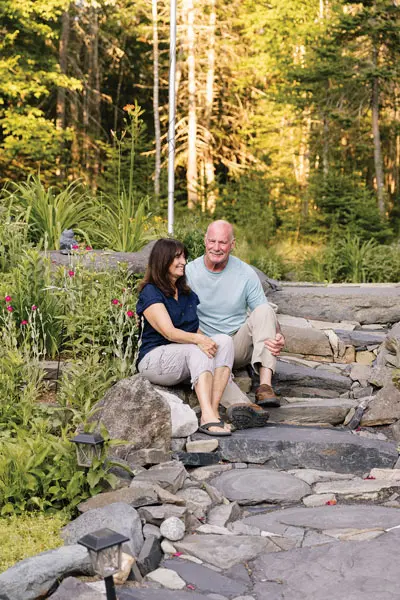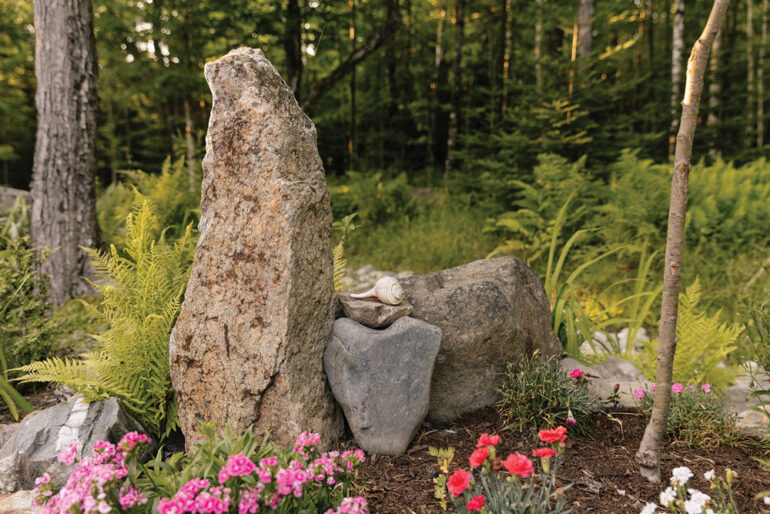By Virginia M. Wright
Photos by Sienna Clough
From our August 2025 issue
Standing atop the terraces he built into the steep slope of his Greenville property, Rick Cochran confessed, “I’m kind of obsessed with rocks. Wherever I travel in the country, I grab different-colored rocks. Some of these rocks were salvaged from demolished mansions in Connecticut.” Not that these nine wooded acres on the east side of Moosehead Lake don’t provide. Quite the contrary: The wellspring of Rick’s enthusiasm is the abundance of stones he unearthed while thinning trees that once crowded his and his wife Karen’s contemporary log home. “I was collecting them, piling them into big heaps, and I thought, ‘What am I going to do with all these rocks?’”

A gardener since boyhood, Rick put them to use as edging for the first perennial beds he planted here and was so pleased with the results that he proceeded to remove more trees, gather more rocks, and make more gardens. “When I ran out of rocks here, I collected them from my neighbors,” he says. Now, they’re the bones of what has become a sprawling, sun-dappled forest garden that Rick calls Rock Haven. Stone steps and terraces break up hillsides lush with hostas and ferns. Stone walls support raised beds of bee balms, delphiniums, foxgloves, phloxes, and roses. Stone paths skirt patches of blackberries, blueberries, strawberries, and raspberries and meadows of bachelor buttons, daisies, sweet Williams, and poppies. Even the fringes of the long, looping crushed-shale driveway sprout daylilies, black-eyed Susans, and coneflowers.
Longtime Connecticut residents, the Cochrans bought the property in 2016 with the intention of retiring there year-round. A former police officer, Rick stopped working first and spent extended periods on his own in Greenville, opening up the forest canopy to air out the house, creating a feeding ground for deer and turkeys, and digging gardens that he filled with the progeny of his mother’s perennials. When Karen retired from teaching, in 2019, they moved to Greenville full-time.
Early on, Rick purchased a tractor so he could more easily move rocks, and he conceived many of his designs as solutions to problems. He laid down a small patio in the area where Karen hangs her birdfeeders, for example, after seeing her struggle through snow and ice to fill them. Likewise, he built the terraced garden alongside the house to mitigate erosion, and he bisected it with stairs for a safe descent to the deeryard. (To protect their plants from the deer they invite here, Rick and Karen sprinkle their flower beds with feather meal, a stinky, sawdust-like repellent made from chicken feathers.)







“Pretty soon, I will run out of room to make any more rock gardens, steps, or patios,” says Rick Cochran, who completed several more projects after we visited.
Rick balances Karen’s love for subtle shade plants like hostas, ferns, lungworts, and jack-in-the-pulpits with his passion for the showy, sun-loving flowers he inherited from his mother. “Some of these flowers are 40 to 50 years old,” he says with pride. “Any time someone wants a plant, I’m happy to divide and share it. I’m spreading my mom’s love of flowers.” Rick credits his mother for his green thumb, but he taught himself how to landscape with stone through trial and error. “Friends ask, ‘When are you going to stop?’” Rick says. He responds by pointing out where his next flower plot or footpath will be. “It’s constantly changing. I get a vision, and then I create it.”




